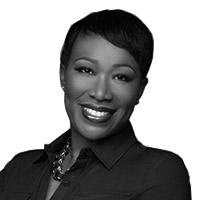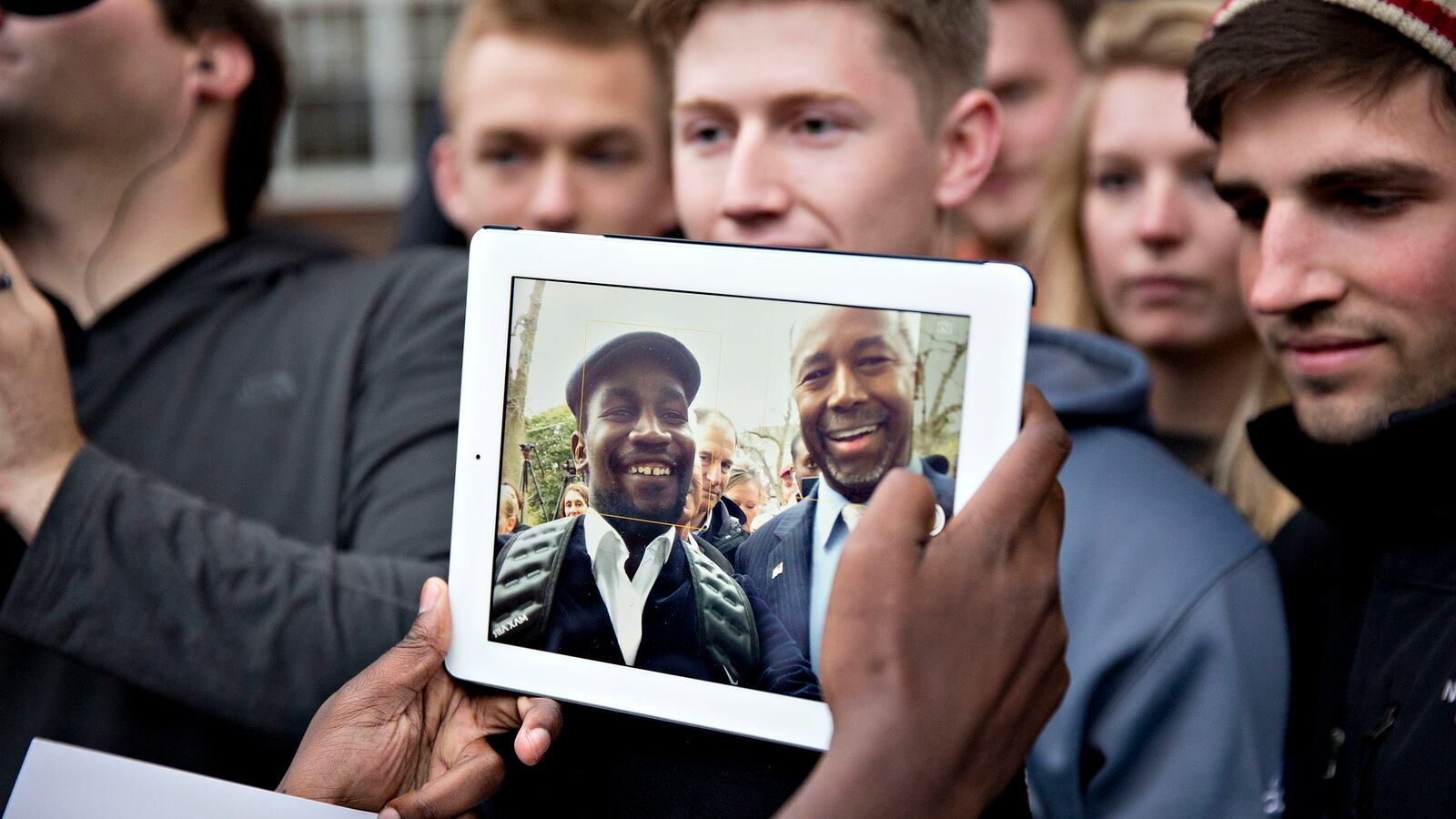Ben Carson has reasons to guard his biography that go well beyond his campaign for the White House.
Carson’s origin story isn’t just a set of inspirational anecdotes, akin to Donald Trump’s often-outrageous claims that, in the end, are simply part of his gadfly campaign. The Carson “started from the bottom” parable—the violence, the teenage rage, and the God-driven transformation and redemption—are the basis of a lucrative cottage industry. Forbes Magazine has pegged Carson’s net worth at $26 million, making him the fourth-richest candidate in the race after Donald Trump, Carly Fiorina, and Hillary Clinton.
Carson built his business by telling his story, not at political rallies or televised debates, but rather at homeschooling conventions and Christian colleges, and on his book tours. Kids and teens made annual pilgrimages to Johns Hopkins in Baltimore for two decades until Carson retired in 2013 after a 29-year run as the director of pediatric neurosurgery. And the families whose children were part of those trips developed a deep and abiding respect for Carson that could provide the candidate with a firewall against media scrutiny.
I should know. My cousin Rolston Carryl was one of them.
Rolston has always been a math wiz. When he came to the U.S. from British Guyana in the 1970s, it was as part of a program the government of then-Prime Minister Forbes Burnham implemented to educate a generation of technocrats who could come back and run the country and modernize its infrastructure.
Instead, like most of his brothers, sisters, uncles, and aunts (my mother included), he stayed in the U.S., living with us for a time, before taking our old, used car on a road trip from Denver to Kansas, and ultimately to Brooklyn. It was there in 1991 that he launched a math-tutoring program called Gem, which every year until 2012 shuttled hundreds of Brooklyn kids to meet Dr. Carson.
The bus trip was the reward for the kids—100 or so at a time—who participated in the free after-school tutoring program at Excelsior Elementary School in Brooklyn’s East Flatbush neighborhood. After a semester getting their grades up, the kids would hit the road, visiting the Washington monuments and museums before heading to Baltimore and Johns Hopkins, where the highlight of the trip was a motivational talk from Dr. Carson.
The program launched four years after Carson’s groundbreaking surgery to separate a pair of German conjoined twins, and seven years after he became Hopkins’ youngest ever—and first African-American—chief of pediatric neurosurgery.
Carson has been an icon in black households ever since. He soon launched his own teen-focused nonprofits, including the Carson Scholars Fund and the Ben Carson Academy summer program, which brings mainly black kids to the Morehouse School of Medicine to study math and science.
Eventually, the number of kids at those annual pilgrimages ballooned from the hundreds to the thousands. His story was made into a TV movie starring Cuba Gooding Jr., and it attracted the attention of evangelical Christians of all races, including his fellow Seventh-day Adventists, like my cousin and his siblings. Like many others, they were attracted to Carson’s accomplishments, his personal story, and his professions of faith.
“When I first saw his book, Gifted Hands, I tried to find the author and found out he was at Johns Hopkins, and that he’s a Seventh-day Adventist, so I contacted Hopkins and said I’d like to meet with him and have him do a motivational presentation, and he liked the idea,” Rolston told me.
“These were kids who had challenges—under-performing black kids for the most part,” Rolston told me regarding the Gem program, which he still operates (the program later expanded beyond Brooklyn to Tennessee and Alabama). “The whole idea was that these kids could excel in math and science given the opportunity and the education.” And inspiration, too, which Carson supplied in those annual sessions with kids and often their parents.
“The heart of his presentation was his life story, and what [the kids] can do if they apply themselves,” Rolston says.
He frequently took his two young sons, “Rollie” and Omar, on the trip, beginning when they were in elementary school. Rollie, now a 20-year-old student, still looks up to Carson as an accomplished man who “was clearly very intelligent,” and showed other African Americans what they can achieve.
Omar, who is now a 28-year-old personal trainer in Boston, agrees.
“At the time, I was probably too young to appreciate the magnitude of who he was,” he said.
“I read his first two books, and looking at where he came from, and knowing you have a black leader you can look up to as a young person—someone who didn’t have opportunities readily available and despite that was still able to make something of himself to the degree that he’s on a global stage and the best at what he does? That rings the loudest to me.”
Whether the media challenges to Carson’s origin story will sway those who have for so long been captivated by him remains to be seen. There are plenty of people who grew up revering Carson but then lost faith in him once he revealed his far-right views, even before the media began rifling through his biography.
“I think that you’ve got a major brand issue,” said Rev. Jamal Bryant, who pastors the Empowerment Temple AME Church in Baltimore, the city where Carson became famous. “His acceleration in the political process has not been about policy or the economy, it’s been on integrity.
“Evangelicals weren’t moving toward Ben Carson based on policy, it was based on his character. All of that has been put into question and it’s put the evangelicals in a quandary because they were touting him as the one who was going to restore the moral standard and fabric of this nation.”
On the other hand, Anthony Verdugo, the founder and executive director of the Christian Family Coalition Florida, sees little chance the media scrutiny will hurt Carson with Christian voters, including those who flocked to Kendall for a Carson book signing last week.
“Ben Carson raised about $3.5 million after the media came out with the story on West Point,” Verdugo said. “He has built his campaign, not on debate performances, [but] on being an outsider candidate who is considered very honest.
“I think those that are his ardent supporters will continue to be his ardent supporters,” Verdugo said. “They see this as a biased attack from the media, and I think the pushback that his campaign initiated from day one helped their narrative, that they were being victimized. They went on offense, and that’s really unique for a campaign to do. Politics is a game of perception and it really hasn’t hurt him in the evangelical community at all.”
Verdugo, whose organization will issue a candidate guide for Florida voters in February, and who is therefore neutral in the primary, home-schooled his children, who have read Carson’s books.
“The home-schooling family is really a subgroup of the evangelical community in general,” he said. “Dr. Carson really has a very compelling life story, and that appeals to folks. It’s not just an ‘up from your bootstrap’ story—that’s good enough, but he mixes faith in there, and I think you’ve got to really respect that.
“When someone who is considered an eminent neurosurgeon, not only in this country but in the world, actually says, ‘When I was younger I had my problems and my issues and I made a faith commitment,’ it encourages young people to say, ‘If he can make it, so can I.’”
My cousin Rolston is reluctant to second-guess Carson’s biography. And he’s deeply uncomfortable with the tone of the Carson media coverage.
“I personally don’t agree with his positions,” Rolston said, “but as a surgeon I respect him. As a role model for black kids, I respect him. His message was that you can achieve just as much. I know the impact that it had on those kids and I can’t take that away from them. The rest of it … I don’t know.”
Robert Beatty, who like Carson is a native of Detroit, and who publishes the South Florida Times black newspaper in Fort Lauderdale, is likewise critical of the media scrutiny. He pointed to a press Q&A following a Carson appearance in Palm Beach last Friday, which he said evinced “a level of aggression, sarcasm, and untenable disrespect by the reporters” toward the candidate.
“I think that Americans, black or white, dislike the media today, number one,” Beatty said. “And number two, they dislike the media being so disrespectful of a man who has achieved so much in his life and for whom there is such wholesale respect whether you are a Republican or a Democrat.”
After Barack Obama, “there is a sacredness to the idea of a black president,” adds April Ryan, a Baltimore native and the White House correspondent for American Urban Radio Networks. She says that as she talks to black voters in particular, she hears a deep ambivalence about Carson, given his long, heroic history with African Americans.
“Black people may not agree with the things Carson is saying, but they don’t want to see him taken down in an undignified way, without having a chance to make his case.”
“They may cut their eyes at his comments,” Ryan continued. “But there is a pride that he has made it this far, and so they want him to have a chance like the other candidates.”
Updated noon Nov. 12, 2015 to add additional information.






